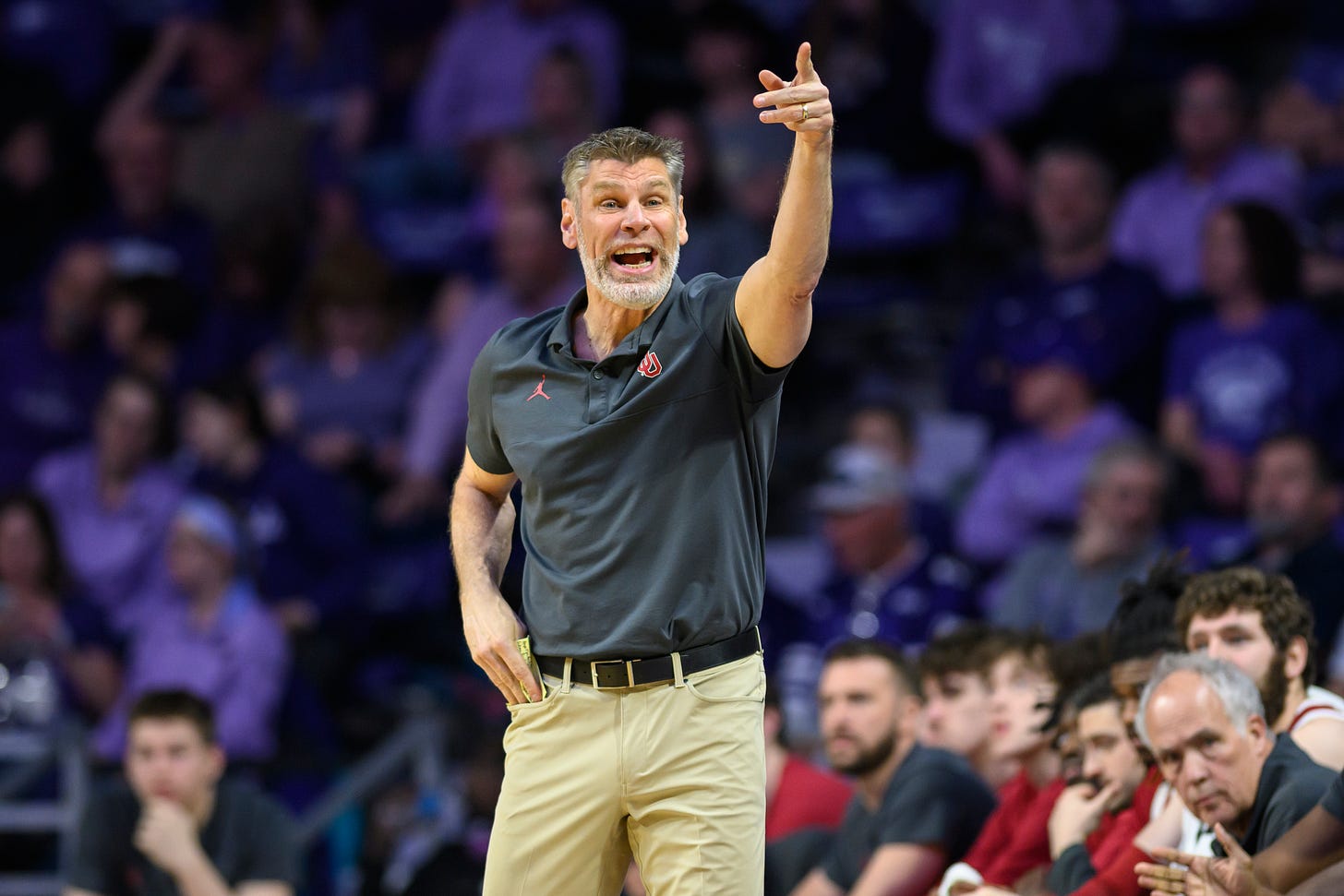Porter Moser's failure at Oklahoma intrinsic to the basketball he refuses to quit coaching

Want a season-late-and-a-million-dollars-short narrative?
Because a-day-late-and-a-dollar-short’s too easy, so what good is it?
Want one?
Here it is:
You don’t want to face Oklahoma.
Yes, it has disappointed and, yes, it’s claimed but five victories over an 18-game Big 12 Conference schedule and, yes, where wins and losses are concerned, this and last season — 34-32 overall, 12-24 in the conference — have been far worse than anybody thought possible, and last in your conference, by golly, is still last in your conference.
But you don’t want to face Oklahoma.
You don’t want to face the Sooners, because look who they’ve topped.
In the Big 12/SEC Challenge, by 24 points, they took down Alabama, maybe the best team in the country.
They beat No. 12 Kansas State by 14 and followed with a two-point overtime loss at Texas. Two games later, they beat NCAA tourney bound Iowa State in Ames and last time out they mowed down 22nd-ranked TCU by 14.
Sure, they finished last in the conference but a dangerous team with nothing to lose is a dangerous team.
You don’t want to face them.
And you really don’t want to face them if you’re Oklahoma State, because everybody knows how hard it is to beat your biggest rival three times in the same season and it’s that much harder when it’s to keep your Big Dance hopes alive, when you must find your game and play it against a squad that ought to know you better than every other team on your schedule.
Sounded good, anyway.
The biggest omission from that hopeful narrative?
It forgot who the coach was: Porter Moser.
Porter Moser, who since the day OU topped then-No. 11 Iowa State behind the heroics of Bijan Cortes way back on Jan. 8, 2022, has proven wholly incapable of maintaining any kind of success at a program that’s experienced plenty through the decades, owning the Big Eight under Billy Tubbs and looking up at only Kansas in the Big 12.
Beating the Cyclones moved OU to 12-3 and 2-1 in the conference last season. Such a game-changer, or so it appeared, the headline my 30-years of award-winning sportswriting led me to put atop my column from it was “Bijan Cortez puts victory, bigger season on Sooners’ table.”
Instead, OU died.
The Sooners lost four straight, beat West Virginia in Morgantown, then lost three straight. They couldn’t score, they turned the ball over at an alarming rate and, though Moser proved he could stand and pace the sideline for 40 minutes every single night, nor could he stop the bleeding
Give him time, they said.
Give him time and, why not?
From 14-14 and 4-11 in the conference after a loss at Texas Tech, the Sooners finally rebounded, winning four straight, three to close out the regular season over OSU, West Virginia and Kansas State and then, who’d have thunk, over third-ranked Baylor at the Big 12 tourney.
This time around?
Sorry.
Those four cherry-picked victories in that doesn’t-matter narrative from above? They came amidst a 14-game stretch in which OU went 4-10.
Then, Wednesday night, inside Kansas City’s T-Mobile Center for another Big 12 tourney, their last chance to do something barring victory giving them another one, the Sooners were rotten from the start.
For most of it, they threatened not to score even a point a minute, settling on 20 first-half points, 36 through 33 minutes, 41 through 38:18 — just to get within 14 points — before finally losing 57-49.
OU shot 25 percent (14 of 56).
It put up 56 shots, 2.7 more than its 53.7 average that ranks 330th out of 363 Division I programs and only that because when you shoot 25 percent you’re going to get some offensive rebounds and OU grabbed 10.
Still, mostly, it was the kind of performance that tells you one thing.
Moser’s team didn’t want to be there.
The players had had enough.
What was the point after two seasons of going nowhere, playing for a coach that everybody says is terrific, just ask them, who’s nonetheless run the program into the ground, playing a brand of basketball nobody wants to play, nor watch, that only makes it harder to win.
“Thought our guys played hard, they defended hard,” Moser said during his postgame radio interview. “I thought we really defended them. Couldn’t make a shot.”
Sure.
“I thought the effort was really good,” he said.
If he says so.
“We can compete against the best teams in the country, but we’ve got to get better,” Moser said. “We’ve got to get better this spring … I know it starts with me and my staff and then through recruiting and development.”
If only one time, he might have said, “We need to play differently,” maybe there’d be a reason to have confidence in the man.
But he hasn’t.
Indeed, his last three teams at Loyola-Chicago — against Atlantic 10 foes that should have had similar athletic prowess as his squad — averaged 52.2, 50.4 and 49.7 shot attempts per game, ranking 333rd, 348th and 351st in the nation.
Even if Moser gets players who might make a difference, the basketball he refuses to quit coaching will hold them back anyway.
Even if better players push the program forward, and given his record of outgoing transfers there’s no reason to believe he can keep them, the way he views the game will continue to hold it back.
“We’re going to get better,” he said.
The moment they bring somebody in to run it who wants to play some some real basketball, they might.

